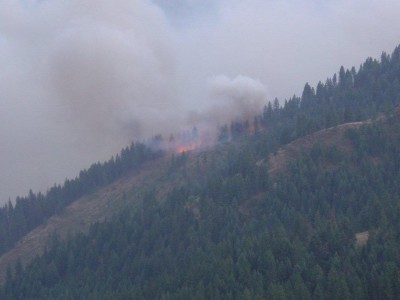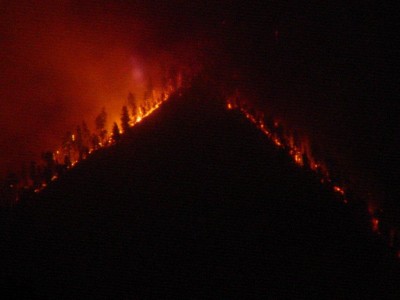Wildfire Preparedness during the dog days of summer is important as Idahoans hit the backcountry and plan to spend time outdoors.
There’s nothing more rewarding than celebrating the beauty of summertime, when clear blue skies, warm temperatures, campfire stories and recreational adventures that create long lasting memories.
 Despite these joys of summer, danger from summer wildfires can lurk in the dry grasses and stands of timber and can erupt abruptly and unexpectedly.
Despite these joys of summer, danger from summer wildfires can lurk in the dry grasses and stands of timber and can erupt abruptly and unexpectedly.
Life cruises along and suddenly a wildfire has the potential to change everything.
Recently, our phone rang late at night, just as we were ready for bedtime. It was our neighbor who said quickly to me “we’ve got a fire down here in our pasture! Can we get some help?”. I uttered the reply, “you bet, we’ll be right down”. We dressed in seconds, gathered our shovels and zoomed down the road to where the pasture was ablaze. “OMG”, we uttered.
Parking a safe distance away, we jumped on the fires edge, and began scraping up dirt on the burning patches of pasture grass to stop the spread of the fire. Other neighbors and family members joined in, working to squelch out the flames as it moved across the pasture toward the Mill Creek drainage. If the fire was able to get to the acres and acres of standing timber, it would change the course of events, sending the burning devastation right towards our own property on a ridge above the timbered valley.
Working together, we all tamped out the fire, but still well aware of the burning embers that could easily be fanned back into a blaze. In fact that fire did erupt again at 5:30 a.m. the next morning. A passerby saw the fire and notified 911, as well as rapping on the door of the property owners. A mile away, we slept and were unaware that the risk of fire danger was ever present.
Idaho homeowners are at risk of great loss when their property, family and pets are in the path of a blazing fire, especially in the rural districts outside of town where clusters of pine trees or high dry grasses provide powerful fuels to feed the fires. A home engulfed in flames has left many wondering if they could have been more prepared.
By being more prepared, can we change the course of events that might avoid devastating losses?
Certainly there have been good stewards of their property who likely took measures to be prepared and despite all efforts, lost everything in a devastating fire. Yet there is a sense that doing nothing, with zero effort invested, helpless in the face of great odds, is simply irresponsible and downright careless. Lady luck would surely remove herself from the events at hand, allowing fate to take full control.
 Any fire meets with a wide range of uncertainties, but through awareness, discussion among family members, and taking steps to be prepared, I believe we are working against the odds that can make a difference when faced with a wildfire barreling towards our home and property. So be prepared and take a serious approach to the potential of fire danger in Idaho’s summer season by reviewing these tips that can help to make a difference.
Any fire meets with a wide range of uncertainties, but through awareness, discussion among family members, and taking steps to be prepared, I believe we are working against the odds that can make a difference when faced with a wildfire barreling towards our home and property. So be prepared and take a serious approach to the potential of fire danger in Idaho’s summer season by reviewing these tips that can help to make a difference.
Tips that can help to protect your property in the face of fast moving wildfires.
1. Clean up the grounds around your home.
Clearing your property of debris such as pine cones and branches that have fallen out of trees, raking up excess pine needles that are piled up, and keeping your grasses cropped and the weeds trimmed, can actually create a fire break if a wildfire is in your midst. Trim low tree branches in the vicinity around your home to at least 10 feet above the ground. Clean out your rain gutters if pine needles, pine cones, leaves have collected and are drying in the hot sun. Prevent flying embers from a fire from getting a new fire started on your roof. Clearing your property to be free of debris is an important step toward reducing the fuel for wildfires and could save your home.
2. Keep shovels, 5 gallon buckets and an old rug or heavy towel handy.
When fire danger is present, knowing that your firefighting tools are in easy access can mean the difference between a quick response and a fire spreading further. Using a shovel or wetting an old rug or towel and tamping out the grass fire can help stop the fire from spreading.
3. Keep a small water tank with a sprayer attached.
If you’re dealing with a small fire from lightening strike, a tank that can be placed on the back of an ATV or truck and quickly filled with water for spraying on embers and smoking spots can certainly help to put out those less intensive fires to keep it from spreading to the trees and building a larger flame.
4. Keep hoses hooked up to spigots.
In the event of a fire, panic sets in. So anytime you are prepared and don’t have to take extra steps, that gives you precious time to spend on other important tasks. During fire season, make sure your hoses are always hooked up to the spigots at all times. If you have to purchase an extra hose for another location around the home or barn, its money well spent in the face of a fire.
5. Stack firewood away from the house.
If you have a fireplace or wood stove and gather your split and stacked wood for the winter season, its best to find a spot away from your house for the main woodpile. Moving and staging smaller stacks of wood in a convenient location next to the house during the winter season is a better idea. If your entire wood pile is stacked against the house in the heat of the summer, you can actually create a very dangerous situation for you and your family if a fire burns near the house or in the woodpile itself. Spare yourself the agony of wishing you had stacked the firewood elsewhere in the event of a wildfire with burning embers that love a good dry woodpile.
Tips to be prepared in the event of evacuation from a wildfire
1. Rural Fire Protection
Be prepared through awareness of the support network available to you in the face of fire. Check your property tax bill. If you see a line item that refers to rural fire department, you are paying taxes on fire protection and you can call 911 as soon as you detect fire. Most rural fire departments are operated through volunteer firefighters, so it takes time for all of the notifications, beepers, fire truck preparations and the distance to wherever your property is located. Definitely call 911 to get the fire department notified, but don’t wait. Take action safely and methodically, calling neighbors for help and doing what you can to put the fire out or at least stopping the spread of the fire.
2. Keep Important Documents Handy
One of the best steps you can take to be prepared for the threat of wildfires is to gather all of your important documents – those that would be difficult or impossible to replace, and put them in a spot where you or a family member can grab it in the event of a devastating fire and evacuation. Do not wait to prepare for the possibility of fire. This is a critical task and in a state of panic, you’ll know exactly where the important documents are stashed and can grab the package and focus on other life saving or property saving tasks.
3. Digital Backups
Today we have access to all sorts of digital means of backing up all of our precious memories and even our most important business information. With cloud computing, backing up your photos and important computer information is very cost effective and easy to manage. For $4 to $6 dollars per month, schedule your entire computer to be backed up a couple times a week, at night while you’re sleeping. Get old family photos scanned onto a disk and then transfer these to your computer for digital backup as well. Today, scanners or scanning services can digitize all of your documents for easy backup as well. Hire this service or purchase a scanner device and do yourself a favor by backing up everything you deem important. These digital backups reside on a server somewhere other than your home, in cyberspace. In the event of a devastating fire, you don’t have to worry about losing treasured photos and documents. They’re easy to recover from your digital backup files.
4. Store jewelry in one place.
Faced with the panic of evacuation, prepare yourself in advance by selecting one spot for storage of valuable jewelry that you may not wear regularly. Grabbing a container and knowing all of your jewelry is there can mean the difference between having to leave those items behind. The last thing you have time for is to stop and think about where all of the various pieces of jewelry are located when you have to get out fast.
5. Sit down with all family members and talk about a Fire Plan.
Whether you make lists or you just talk about the uneventful threat of fire, its extremely important that every member of your family is involved in the Fire Plan. From children to teens and elderly adults, every family should have a serious discussion together about what the priorities are if fire danger becomes a reality. Someone needs to be responsible for gathering the pets, grabbing important items, and others may be stationed to help with the spread of fire itself. Whatever the Fire Plan is for your family, be sure to take time to have a focused discussion about “what to do”, “what to grab” and how to be prepared.
Talking about events before they happen can really help to reduce chaos and keep members of the family focused on the important things that really matter.

